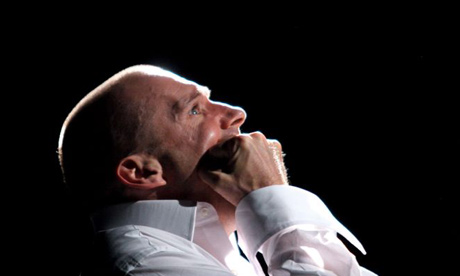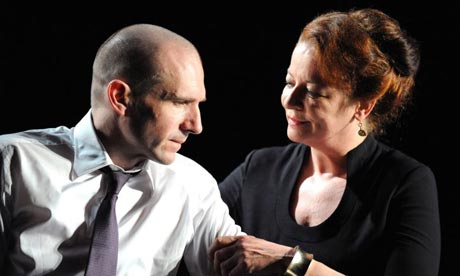- Thursday October 16 2008

Humility through suffering: Ralph Fiennes as Oedipus. Photograph: Catherine Ashmore
It is 12 years since we saw Sophocles' masterpiece on the Olivier stage and the contrast between then and now is palpable. Peter Hall's production was masked, formal and in rhyming couplets.
Jonathan Kent opts for sharp modern suits and language of brutal simplicity. But, while I find Kent's approach impressive, I wish he followed Hall's lead in also giving us Oedipus at Colonus which has a healing quality that balances the earlier work's savage horror.
There are many ways of looking at Sophocles' hero. You can see him as a helpless victim of fate or an exemplary seeker after truth. But the bias of Frank McGuinness' version and Ralph Fiennes' performance is to view him as an arrogant, hubristic figure who achieves humility through suffering. And despite advance strictures, McGuinness' translation admirably brings out the play's tragic trajectory.
His Oedipus is a man who says of his Corinthian youth, "I was the man to beat in that city" and who even dismisses Jocasta's supplications with "your best is not my best". But there is an ironic circularity to this version in which Oedipus, having described Laius's murderer as "filth", finally applies the word to his own parricidal, incestuous self.
Fiennes is also the right actor to execute this interpretation. He radiates an instinctive hauteur which underscores Oedipus' purblind pride. But he also shows the hero to be a man destroyed less by destiny than by his own impetuous curiosity. And, at the last, it is hard not to feel pity for this fallen figure as he enjoins his children to "lead a good life, better than your father's". It is a fine performance spoiled only by Kent's decision to use amplification to register Oedipus' offstage cry of horror: a touch that would have this theatre's namesake spinning in his grave.
That aside, Kent's production is propulsive, clear and strongly cast. Alan Howard, Oedipus in Hall's revival, also magnificently reinforces the Beckettian resonance by playing the blind Teiresias as a mocking prophet with an Irish lilt. Jasper Britton deftly captures Creon's transition from condemned truth-teller to heartless power-seeker. And Clare Higgins as Jocasta, whose relationship with Oedipus is overtly sexual, has a great moment when she realises the terrible truth and her face darkens like a city suddenly deprived of illumination.
But this is a production that succeeds because it shows Oedipus not as the gods' puppet but as a man whose suffering is related to his character flaws; which is a classic definition of traged
What to say about ... Oedipus at the National Theatre
Wondering how to respond to this famous Greek tragedy? Mark Espiner does a very Fiennes search through reviews to avoid uttering the blindingly obvious
- Friday October 17 2008

Oh mother ... Ralph Fiennes and Claire Higgins in Oedipus (Guardian)
So you find yourself, for your sins, in a social setting, the Spectator pre-Christmas cocktails, say, or the London's Mayor's Save Our Bankers fundraising party, where everyone only reads the Telegraph and the conversation falls to Ralph Fiennes's performance as Oedipus. How to deal with that organ's chief critic's disappointment at the show and his bitter dismantling of the production?
It's amazing, you say first up, how modern Greek tragedy can be. Jonathan Kent's production, which dresses Fiennes's Oedipus and the chorus of 14 men in suits to resemble "anguished city investors who have just learned that their hedge fund has gone bust" (Telegraph), proceeds with "an intensity that bangs home the conclusion Sophocles wanted and, in our own, way, we're relearning: that life is unnervingly precarious, desperately insecure" (The Times). This you conclude as Benedict Nightingale does in the Times, "is a mini-opera of horror and suffering", that is relevant for us and our own credit crunch catastrophe. "It happened to Thebes. Could something analogous happen to us?" you ask.
By that you don't mean that some estranged royal could suddenly come back to save the City and the crisis besetting it, end up killing the Duke of Edinburgh and shagging the Queen and then be so overwhelmed at his crime that he blinds himself. Of course not. No. It's just that this production "unravels with the gripping fervour of a courtroom drama" (Whatsonstage) and succeeds because "it shows Oedipus not as the gods' puppet but as a man whose suffering is related to his character flaws; which is the classic definition of tragedy" (Guardian).
You may chuckle, though, at Charles Spencer's assessment of Ralph - whose name you are careful to rhyme with "safe" - Fiennes's performance. But you don't agree that his Oedipus, "with his sinister shaved head looks disconcertingly like the pub landlord, Al Murray, and who occasionally lapses into his old mannerism of sounding like Rigsby in Rising Damp, isn't up to the task." Instead, you bring in the Guardian's Michael Billington to support your case. Fiennes "radiates an instinctive hauteur which underscores Oedipus's purblind pride." He is, you go on, borrowing from Michael Coveney's review in What's on Stage, "superb throughout – enigmatic, tense, compelling - and particularly good at expressing his grasp of unwelcome news in the embrace of the chorus."
This new version by Frank McGuinness helps. It is "terrific" (What's on Stage) and is not, as the Telegraph would have it, "an uneasy blend of stark poetry and sudden eruptions of banal colloquialism". His text has Sophocles's hero as an "arrogant, hubristic figure who achieves humility through suffering" and it "brings out the play's tragic trajectory" (Guardian).
Alan Howard's blind prophet Tiresias deserves a mention. He gives the role a "Beckettian resonance" you observe. Toss in here as an aside, as all the critics do, that Howard himself played Oedipus in Peter Hall's production 12 years ago - on the same stage. And then hint at the play's dark sexual undertones that so fascinated Freud by citing Clare Higgins' performance as Jocasta, who plays her relationship with her son Oedipus as "overtly sexual" and has a great moment when she realises the terrible truth and her face darkens "like a city suddenly deprived of illumination" (Guardian).
That should have them all spitting in their martinis, as you rush off to actually get a ticket for the show that you haven't yet seen.
Do say: It's blindingly good
Don't say: It's all Greek to me
Reviews reviewed: A Fiennes tragedy for our times
Oedipus at the Olivier, National Theatre
A parable for precarious times . . . like ours

(Donald Cooper)
«Αν δεν βάζεις το κεφάλι σου στον ντορβά, δεν μπορείς να παίξεις τους Ελληνες», δήλωσε λίγο πριν την πρεμιέρα ο Ρέιφ Φάινς |
«Οι ηθοποιοί έχουμε μάθει να καταφεύγουμε στις χειρονομίες και στον ωραίο λόγο. Στον "Οιδίποδα" κατάλαβα ότι έπρεπε να ξεμάθω πράγματα. Οταν παίζεις Ελληνες δεν πρέπει να διστάσεις. Αν δεν βάλεις το κεφάλι σου στον ντορβά, δεν μπορείς να αποδώσεις την αποστροφή, τη φρίκη, τον φόβο, τη βία. Χρειάζεται να βρείς κουράγιο να... αφαιρέσεις το καπάκι».
Φαίνεται ότι τα κατάφερε. Οι πρώτες κριτικές είναι εξαιρετικές. «Ο Τζόναθαν Κεντ προκρίνει αιχμηρά μοντέρνα κοστούμια και μια γλώσσα ζωώδους απλότητας. Βρίσκω εντυπωσιακή την προσέγγισή του», γράφει ο Μάικλ Μπίλινγκτον στην «Γκάρντιαν». «Υπάρχουν πολλοί τρόποι να δεις τον ήρωα του Σοφοκλή. Αλλά η κατεύθυνση τόσο της μετάφρασης του Φρανκ ΜακΓκινες όσο και της ερμηνείας του Ρέιφ Φάινς οδηγούν σε έναν αλαζόνα, ασεβή Οιδίποδα, που κατακτά την ταπεινότητα μέσα από τα βάσανα. Ο Φάινς είναι ο σωστός ηθοποιός. Ακτινοβολεί έμφυτο μεγαλείο, που υπογραμμίζει την κοντόφθαλμη υπερηφάνεια του Οιδίποδα. Πλάθει έναν ήρωα που καταστρέφεται περισσότερο από τη δικιά του ασυγκράτητη περιέργεια παρά από τη μοίρα».
Ολα αρέσουν στον Μπίλινγκτον, μόνον ένα τον ενόχλησε, αλλά «θα έκανε και τον Λόρενς Ολίβιε, που έχει βαφτίσει το θέατρο που φιλοξενεί την παράσταση, να στριφογυρνάει στον τάφο του». Ο Τζόναθαν Κεντ χρησιμοποίησε μικροφωνική ενίσχυση για την εκτός σκηνής κραυγή φρίκης του Οιδίποδα, όταν τυφλώνεται.
Και επειδή οι Βρετανοί δεν έχουν το ταμπού να συγχέουν το αρχαίο δράμα με ψυχολογικό θέατρο και Φρόιντ, ο Φάινς για να προωθήσει την παράσταση έφτασε στο σημείο να συνομιλήσει μέσω των «Τάιμς» με τον ψυχαναλυτή Ανταμ Φίλιπς για τη σχέση του με τη... μαμά του, τη γνωστή συγγραφέα και ζωγράφο Τζένιφερ Λας. Του λείπει πολύ, λέει. Αλλά από την άλλη, νιώθει και ανακούφιση που δεν ζει πια για να τον δει να παντρεύεται επί σκηνής τη μητέρα του.




No comments:
Post a Comment